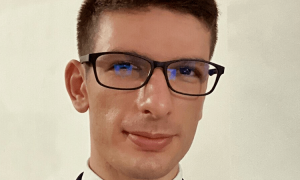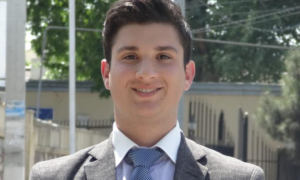Two Jehovah’s Witnesses – given one-year suspended prison terms and living under restrictions for refusing compulsory military service on grounds of conscience – failed to overturn their criminal convictions at the Supreme Court in April.
Two conscientious objectors – both of them Jehovah’s Witnesses – have failed to overturn their criminal convictions at Azerbaijan’s Supreme Court in the capital Baku. The court rejected Emil Mehdiyev’s appeal on 10 April. It similarly rejected Vahid Abilov’s appeal on 24 April. Both were given one-year suspended jail terms in 2018 and have to live under restrictions.
Both sentences expire in October 2019, after which the men will still have a criminal record
 Â
ÂDespite an explicit commitment to the Council of Europe ahead of its accession in 2001, Azerbaijan has never established a civilian alternative to compulsory military service for all young men (see below).
The Human Rights Ombudsperson’s Office in Baku has not responded to Forum 18’s December 2018 enquiry as to what action (if any) it had taken to defend the rights of Mehdiyev and Abilov or push for an alternative civilian service to be established in line with Azerbaijan’s Council of Europe commitment (see below).
Meanwhile, jailed Shia Muslim Imam Sardar Babayev is awaiting a decision in his case from the European Court of Human Rights in Strasbourg, his lawyer Javad Javadov told Forum 18. Babayev is the first (and so far only) individual known to have been punished for the “crime” of leading worship in a Muslim community after having gained his religious education outside Azerbaijan (see below).
Muslim prisoner of conscience Telman Shiraliyev, given an extra nearly six months’ jail term in October 2018 for alleged violation of prison rules, was freed on 18 February after a Baku court reduced his jail term by just over a month. He had been jailed since 2012 for protesting against an Education Ministry ban on girls wearing the hijab headscarf (see below).
Muslim theologian and prisoner of conscience Zulfuqar Mikayilzade (also known as Mikayilov) was freed from prison on 17 March, the day after he was included in a presidential amnesty decree. Deputy leader of the Muslim Unity Movement, he was arrested in November 2015 amid a massive security assault on the village of Nardaran near Baku. He had been serving a 17-year jail term (see below).
First conscientious objector’s Supreme Court appeal fails
Jehovah’s Witness conscientious objector Emil Vilayat oglu Mehdiyev (born 12 December 1999) has failed at the Supreme Court in Baku to overturn his criminal conviction for refusing compulsory military service on grounds of conscience. On 10 April, Judge Tahir Kazimov of the Court’s criminal division rejected his appeal, according to court records.
After his call-up for military service in December 2017, Mehdiyev repeatedly told the Conscription Office he could not perform military service on grounds of conscience and was willing to perform an alternative civilian service.
However, prosecutors brought a case against Mehdiyev under Criminal Code Article 321.1. This states: “Evasion without lawful grounds of call-up to military service or of mobilisation, with the purpose of evading serving in the military, is punishable by imprisonment for up to two years [in peacetime]”.
On 6 July 2018, Barda District Court convicted Mehdiyev and handed down a one-year suspended prison term, and required that he live under probation for one year. During this time, Mehdiyev must report to the authorities each week and remains under travel restrictions.
Mehdiyev appealed against his conviction, but Ganca Appeal Court rejected his appeal on 8 October 2018. The sentence then came into legal force, meaning that it will expire on 8 October 2019.
Mehdiyev lodged his appeal against his criminal conviction to the Supreme Court on 10 December 2018.
Second conscientious objector’s Supreme Court appeal fails
Jehovah’s Witness conscientious objector Vahid Gunduz oglu Abilov (born 2 May 1999) has failed at the Supreme Court in Baku to overturn his criminal conviction for refusing compulsory military service on grounds of conscience. On 24 April, Judge Hafiz Nasibov of the Court’s criminal division rejected his appeal, according to court records.
Abilov refused to serve in the army after his call-up in May 2017. “My Bible-trained conscience prevents me from taking up military service,” he told Agdam District Conscription Office in writing. “I do not evade, or even think of evading, the fulfilment of my civic duty. I just kindly ask you to provide me with alternative civilian service instead of military service.”
Prosecutors brought a criminal case against Abilov on 9 July 2018 under Criminal Code Article 321.1.
Abilov appealed against his conviction, but Ganca Appeal Court rejected his appeal on 31 October 2018. The sentence then came into legal force, meaning that it will expire on 31 October 2019.
Abilov lodged his appeal against his criminal conviction to the Supreme Court on 12 January 2019.
“The terms of the restrictions Vahid Abilov must live under during the year remain very vague,” Jehovah’s Witnesses complained to Forum 18 in December 2018.
Will Ombudsperson’s Office help conscientious objectors?
Ahead of its accession to the Council of Europe in January 2001, Azerbaijan promised “to adopt, within two years of accession, a law on alternative service in compliance with European standards and, in the meantime, to pardon all conscientious objectors presently serving prison terms or serving in disciplinary battalions, allowing them instead to choose (when the law on alternative service has come into force) to perform non-armed military service or alternative Civilian service”.
Azerbaijan has never done this, and conscientious objectors to military service have been repeatedly prosecuted and even jailed under Criminal Code Article 321.1.
Forum 18 asked the Human Rights Ombudsperson’s Office in Baku in writing on 17 December 2018 (resent on 30 April 2019) what action (if any) it had taken to defend the rights of Mehdiyev and Abilov. It also asked what action (if any) it had taken to push for the adoption of a law to allow for those who have conscientious objections to military service to perform a civilian alternative service, which Azerbaijan committed to introduce by 2003.
Forum 18 had received no reply from the Ombudsperson’s Office by the end of the working day in Baku on 1 May.
Awaiting European Court decision
 Jailed Shia Imam Sardar Akif oglu Babayev (born 12 March 1974), punished for leading Muslim worship having gained his religious education outside Azerbaijan, is awaiting a decision in his case from the European Court of Human Rights (ECtHR) in Strasbourg, his lawyer Javad Javadov told Forum 18 from Baku on 1 May.
Arrested in February 2017, Imam Babayev was given a three-year prison term by a court in the southern town of Masalli in July 2017. He is the first (and so far only) individual known to have been punished for the “crime” of leading worship in a Muslim community after having gained his religious education outside Azerbaijan.
Prisoner of conscience Babayev was sentenced under Criminal Code Article 168-1.3.1 (“Violation of the procedure for religious propaganda and religious ceremonies”), including the conducting of Islamic rites by a citizen who received their Islamic education abroad, and committing this “crime” repeatedly carries a penalty of a prison term of between two and five years.
Babayev’s lawyer Javad Javadov lodged the case to the ECtHR (Application No. 34015/17) on 2 May 2017, after he failed in his challenge through the local courts to Babayev’s February 2017 arrest.
Javadov updated the application to the ECtHR after Masalli District Court handed down the three-year prison sentence in July 2017. Shirvan Appeal Court rejected Imam Babayev’s appeal in September 2017. The Supreme Court in Baku rejected Imam Babayev’s final appeal against his conviction in February 2018.
The Azerbaijani government submitted its response to the ECtHR on 1 February 2019, the deadline the court had given it, court officials told Forum 18 from Strasbourg. “The government’s response was, as usual, not serious,” Javadov told Forum 18. “The communication phase is over and we are now awaiting a decision. It is not yet known when this will be.”
Babayev is currently being held in Prison No. 17 in Bina in eastern Baku. “He faces no obstacles in praying, and he has a Koran,” his lawyer Javadov told Forum 18 on 1 May. “Conditions are reasonable.”
The address of the prison where Babayev is being held:
17 sayli Cazacakma müassisasi
AZ-1045, Baki sahari
Khazar rayonu
Bina qasabasi
Azerbaijan
Â





